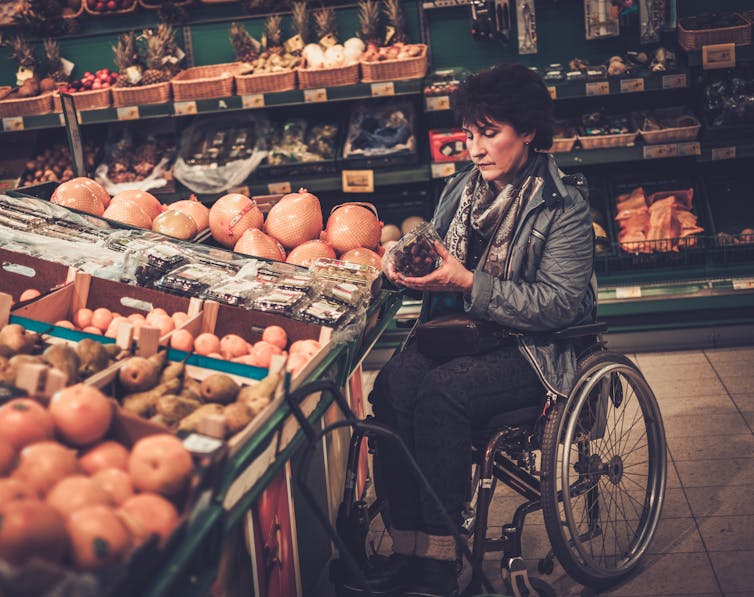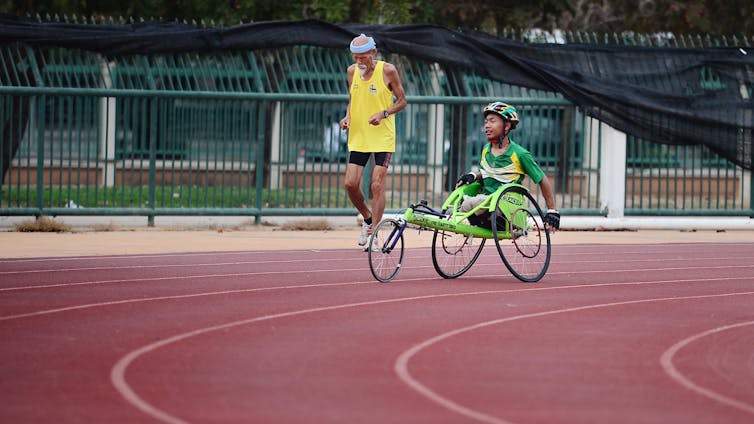
Mary Ann McColl, Queen’s University, Ontario
Recently, an Alberta woman with an obvious physical disability was asked to leave a grocery store and not come back because she could not pack her own groceries quickly enough. According to the report on CBC’s Go Public, the checkout clerk said she was slowing down the line as she struggled to bag her groceries, and the store said no staff was available to help her. Presumably, neither were other patrons.
This story is consistent with what many disabled people say they experience. The Human Rights Commission says that almost 60 percent of all claims cite disability as the basis for discrimination. People with disabilities are routinely denied the rights we all know they are entitled to. A poll commissioned by the Rick Hansen Foundation, found that 90 percent of Canadians agree that accessibility for people with physical disabilities is a right, not a privilege, but there is still a clear prejudice in how disabled people are treated.
Disability is a sensitive topic. Fear of saying the wrong thing prevents people from saying anything at all and makes us avoid having important conversations about disability. This avoidance, in turn, creates the kind of toxic environment that leads to situations such as the one described above.
In our research at the Canadian Disability Policy Alliance, we worked with disability advocacy groups to assemble some guidelines to help readers gain confidence in their ability to participate in positive ways in the dialogue with people with disabilities. Here, we share those guidelines:
Listen to how people talk about themselves
The Canadian government has advocated “people-first” language which emphasizes putting the person first and the disability second: for example, saying a person with a spinal cord injury, or a person with a history of depression. Many disabled people, however, say the disability is not inside of them: they are not a “person with a disability.” Rather they are a “disabled person” — someone who is disabled by a world that is not equipped to allow them to participate and flourish. But they are a person either way. Avoid objectifying people by referring to them as “the disabled.” Our advice is to listen to how people talk about their disability themselves and take your cue from them.

Arisa Chattasa /Unsplash, CC BY
Avoid euphemistic language
Language like “differently-abled” or “diverse-ability” suggests there is something wrong with talking honestly and candidly about disability. It might even suggest to some people that there is something shameful about disability; or that we can’t talk about it directly unless we make it cute or pretty or funny.
Avoid unnecessary emotional tone
Disability is a fact of life for almost one-quarter of Canadians. Having a disability doesn’t make someone a hero, a saint, a victim, a burden or a soldier. This type of hyperbole gets in the way of having authentic relationships with people with disabilities. These words suggest one-dimensional characters. Instead, think: complex, interesting people, just like everyone else.
Avoid ‘handicap’
The word handicap or handicapped is viewed as having a negative connotation — an implication that people with disabilities are disadvantaged in society. That social disadvantage is something we should fight against, rather than merely accept and enshrine in language.
Avoid calling a disabled person a ‘patient’
A patient is a passive individual who has turned over responsibility for important decisions to a health professional. People with disabilities, for the most part, live independent lives in the community. They are no more patients than anyone else getting on with their lives in the community.
Avoid calling non-disabled people ‘normal’
If non-disabled people are normal, then that means that disabled people are abnormal. Yet disability is the norm for some people. It is alienating and marginalizing to classify someone as “abnormal.”
Refer to a person’s disability?
Is the disability a pertinent issue in the conversation you are having or the introduction you are making? We don’t specify a person’s gender, ethnicity, occupation or many other personal details when introducing them. Disability is a condition of life, like those others. It will be salient in some conversations and not in others.
Here are some ‘dos’
Do look people with disabilities in the eyes and address them courteously, as you would anyone else.
Do ask if you can help, and how you can help.
Do assume that people with disabilities have something to say, and be prepared to hear it.
Do talk about disability. It’s a fact of life for 22 percent of Canadians.
The more we talk about it, the easier it gets to have the important conversations we need to have with disabled people and to ensure that the rights we promise to all Canadians are extended to them.![]()
Mary Ann McColl, Professor, Queen’s University, Ontario
This article is republished from The Conversation under a Creative Commons license. Read the original article.




31 Comments
Pingback: slot88 online
Pingback: Kaws
Pingback: orange hawaiian mushroom for sale magic boom bars where to buy psilocybin capsules for sale
Pingback: yehyeh
Pingback: Mushroom Golden Teacher
Pingback: buy drivers license online
Pingback: spin 238
Pingback: superkaya88 login
Pingback: casino
Pingback: ข่าวบอล
Pingback: piano jazz music
Pingback: ฟันคัพ
Pingback: เชื่อมสแตนเลส
Pingback: Devops Consulting services
Pingback: veganistische matte lippenstift
Pingback: ai ดูดวง
Pingback: unieke reizen
Pingback: ตรวจ nipt ราคา
Pingback: เว็บสล็อต
Pingback: rondreis gambia
Pingback: Micro Step
Pingback: zerds strain
Pingback: บุญมี สล็อต
Pingback: กระเบื้องปูพื้น ภายนอก
Pingback: Honeymoon Bali Murah
Pingback: cinema rule
Pingback: Massage
Pingback: 7 อันดับค่ายเกม สล็อตมาแรง
Pingback: upx1688
Pingback: รับจดทะเบียนบริษัท
Pingback: pk789